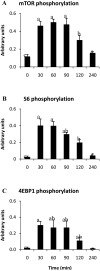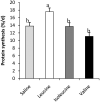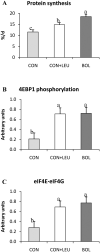Leucine is a major regulator of muscle protein synthesis in neonates
- PMID: 25408462
- PMCID: PMC4304911
- DOI: 10.1007/s00726-014-1866-0
Leucine is a major regulator of muscle protein synthesis in neonates
Abstract
Approximately 10% of infants born in the United States are of low birth weight. Growth failure during the neonatal period is a common occurrence in low birth weight infants due to their inability to tolerate full feeds, concerns about advancing protein supply, and high nutrient requirements for growth. An improved understanding of the nutritional regulation of growth during this critical period of postnatal growth is vital for the development of strategies to improve lean gain. Past studies with animal models have demonstrated that muscle protein synthesis is increased substantially following a meal and that this increase is due to the postprandial rise in amino acids as well as insulin. Both amino acids and insulin act independently to stimulate protein synthesis in a mammalian target of rapamycin-dependent manner. Further studies have elucidated that leucine, in particular, and its metabolites, α-ketoisocaproic acid and β-hydroxy-β-methylbutyrate, have unique anabolic properties. Supplementation with leucine, provided either parenterally or enterally, has been shown to enhance muscle protein synthesis in neonatal pigs, making it an ideal candidate for stimulating growth of low birth weight infants.
Figures







References
-
- Abdelhamid AE, Chuang SL, Hayes P, Fell JM. In vitro cow’s milk protein-specific inflammatory and regulatory cytokine responses in preterm infants with necrotizing enterocolitis and sepsis. Pediatr Res. 2011;69:165–169. - PubMed
-
- Anthony JC, Anthony TG, Kimball SR, Vary TC, Jefferson LS. Orally administered leucine stimulates protein synthesis in skeletal muscle of postabsorptive rats in association with increased eIF4F formation. J Nutr. 2000;130:139–145. - PubMed
-
- Atherton PJ, Etheridge T, Watt PW, Wilkinson D, Selby A, Rankin D, Smith K, Rennie MJ. Muscle full effect after oral protein: time-dependent concordance and discordance between human muscle protein synthesis and mTORC1 signaling. Am J Clin Nutr. 2010a;92:1080–1088. - PubMed
-
- Atherton PJ, Smith K, Etheridge T, Rankin D, Rennie MJ. Distinct anabolic signaling responses to amino acids in C2C12 skeletal muscle cells. Amino Acids. 2010b;38:1533–1539. - PubMed
-
- Baille AGS, Garlick PJ. Attenuated responses of muscle protein synthesis to fasting and insulin in adult female rats. Am J Physiol Endocrinol Metab. 1991;25:E1–E5. - PubMed
Publication types
MeSH terms
Substances
Grants and funding
LinkOut - more resources
Full Text Sources
Other Literature Sources
Miscellaneous

